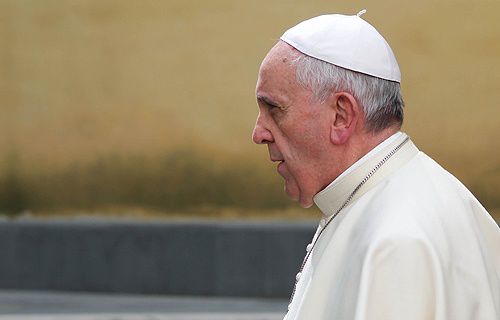The environment is facing serious threats such as climate change and global warming, Pope Francis has said — adding that finding solutions is a matter of justice since it's often the poor who are most affected. “We must not forget the grave social consequences of climate change. It is the poorest who suffer the worst consequences,” the Pope said Sept. 11. Therefore the issue of climate change “is a matter of justice; it is also a question of solidarity, which must never be separated from justice,” he said, adding that the dignity of each person, “as peoples, communities, men and women, is at risk.” Pope Francis directed his address to the 300 participants in a meeting organized by the Foundation for Sustainable Development titled: “Environmental justice and climate change.” The event was attended by key figures in religion, politics, economic activity and various sectors of scientific research, as well as several international organizations and individuals involved in the fight against poverty. Many of the themes covered in the Pope’s speech are reminiscent of his recent encyclical on the environment “Laudato Si,” meaning “Praise be to You.” Published June 18, its name is taken from St. Francis of Assisi's medieval Italian prayer “Canticle of the Sun,” which praises God through elements of creation like Brother Sun, Sister Moon, and “our sister Mother Earth.” Francis is also expected to address the topic of climate change and the environment during his Sept. 25 speech to a U.N. Special Summit on Sustainable Development in New York, which will gather hundreds of politicians and heads of state from around the world. In his speech today, the Pope said that climate change, global warming and the increase in extreme weather events are all indicators that the environment is seriously at risk. These things have become the subject “of great media attention and public opinion, surrounded by heated scientific and political debates, from which emerged a widespread consensus, although not unanimous,” he observed. Pope Francis cautioned that science and technology have placed an “unprecedented power” in in our hands, and stressed that it is our duty, for the good of all humanity, particularly the poorest and future generations, to use this power for the common good. “Will our generation be remembered for having generously shouldered its grave responsibilities?” he asked. “Amid the many contradictions of our time, we have good enough reason to nurture the hope of being able to do so. And we should let ourselves be guided by this hope.” Each person is called to personally respond to the extent in which they are able, he said, explaining that this is done by producing “improbable recipes,” because no one has them. Instead, each person is required to contribute with the goal of attaining results that are borne of a joint effort in the various realms of society, such as religion, politics, economic activity and scientific research. Such dialogue must be founded on “a vision as transparent as it is broad-ranging,” and should move forward with an “integral and above all participatory approach, including all interested parties, including those who more easily remain at the margins of institutional processes,” the Pope continued. He urged those present to ensure that the poor are heard in the search for solutions to “the unique and complex socio-environmental crisis,” since listening to their voice is also “a duty of environmental justice.” Pope Francis then noted several key gatherings set to happen in the coming months to address the topic of environment, including the approval of the Sustainable Development Goals by the United Nations at the end of the month, as well as the COP 21 in Paris Nov. 30-Dec. 11. Faced with “the emergency of climate change…I wish to propose that this dialogue become an authentic alliance leading to truly significant and effective global environmental agreements,” he said. The Pope closed his speech by assuring attendees of his personal prayer and support, as well as that of the Church. He prayed that the Lord would listen to the cry of the land, noting that “today our mother earth is among the many excluded who ask for help from heaven — our mother and our sister, and of the poorest among us who inhabit the earth and care for her.” With God’s assistance “creation will increasingly resemble the common home that the sole Father imagined for us as a gift to the universal family of His creatures.”

